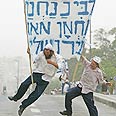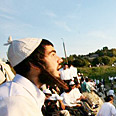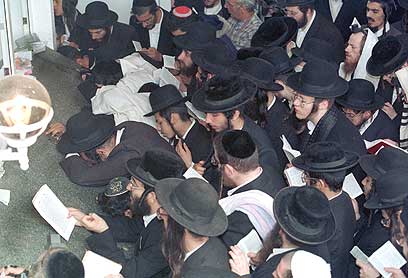

And if you’d met me on the previous Shabbat with the same kippah on my head, before the afternoon prayers and after an overdose of cholent, you’d have thought I was one of the most relaxed people around. But I’m not.
I went to the north for the weekend. To a small house with a red roof in the heart of Moshav Meron, a house where it’s a mitzvah to be happy. A sort of alternative universe in which people sit around the table and sing, and dance even when there isn’t really room to dance. A house of N-nachim, which is what the ultra-Orthodox call the Breslaver hassidim who spread the message that “there is no despair in the world at all.”

Braslev hassidim in Uman (Photo: AP)
Two days later I joined them in their music and their cries of “N-nach-nachm-nachman mi’uman” around Tel Aviv. But this was just the dessert, with the main course being to meet N-nachim.
To make their acquaintance when their vans are parked next to the house, when there are no loudspeakers with trance music and no crowd encouraging them to continue. To find out if they really are happy, cool religious people, or whether their joy is just a disguise for their attempts to make others religious.
Trance music floods the street
Because I’m a negative sort of person, let’s start with what they are not: They did not patronize me or preach to me and they didn’t attempt to explain to me what is bad in my world or what is good in theirs. Other than doing me the honor of calling me to the Torah on Shabbat - I hadn’t done this since my bar mitzvah - they didn’t give me any special attention.
It was a regular Shabbat at Uri and Neta Eliav’s home in Meron, a home belonging to modest people who spread the word of joy to the people of Israel and host others like them on Shabbat. I was another guest, not someone for whom they make the children behave.
In fact, when Shabbat ended we played soccer together in the neighborhood soccer field. If you knock someone over, as soon as the attack is over you run up to him and scream, “Forgive me, I didn’t mean it.” I’m not making this up.
And it really was fun. It must sound worrisome, but I really enjoyed that Shabbat. There were no girls, no drugs, no alcohol, no TV. My cell phone was turned off the entire Shabbat. I didn’t smoke even one cigarette, and miraculously I didn’t have a hard time with that. I was surrounded by strangers whose preferred conversation at breakfast was which mikveh (ritual bath) had colder water, and I didn’t feel like an outsider.
Everyone there had grown up in my unhappy non-religious world, and deserted it for a life based on the teachings of a rabbi who died at some point in the early 19th century in Ukraine. I had such a good time with them, that I thought - and this must sound really worrisome - that perhaps it would be a good idea if I, too, abandoned the foolishness of this world and crossed the lines to that place they’d all gone to.
I’ve thought about them a lot since then, about these people who became religious. That if they found something in the warm bosom of Judaism, then I certainly could too. I know that this sounds as if they brainwashed me with water from the Baba Sali on the small moshav near the grave of Rabbi Shimon Bar Yohai, but I really found logic in the way things were done on that Shabbat. I even woke up early to pray, and that is really a miracle.
I got up like everyone else for morning prayers, which were timed so that “Shema Yisrael” would be said exactly when the sun was rising outside the synagogue. Immediately following the songs and dances that ended the evening I went to sleep. It was about ten o’clock, and without TV, girls, or other forms of entertainment, I found myself alone in bed, in a dark room where it was forbidden to turn on the light, and miraculously I even managed to fall asleep.
It wasn’t just the food or the sleep or the prayers in the modest synagogue in the yard of that house. It was the joyous atmosphere, or perhaps the correct word would be “amused.” Sometimes during prayers they competed with each other to see who would sing the loudest. Sometimes they allowed Ilan, the cantor from Jerusalem, to sing his Ashkenazi melody, and they joined him. On Friday, after Shabbat had begun, they danced and sang in circles around the synagogue.
But beneath the songs, the joy, the jumping around, and the dancing, I found quiet there. A sort of quiet that could come only after someone else had already decided for you what you’d be doing that day, what was allowed and what was not. A sort of real peacefulness that I hadn’t found in any guest house with a Jacuzzi, or in any relaxed or wild weekend in the city.
Happiness banishes fear
What these people do during the week can be seen all over Israel: Groups of young people with sidelocks and white kippahs storm the streets of the sleepy cities and make the passersby smile.
This is actually their philosophy in a nutshell: Rabbi Nachman claimed that Judaism did not need to be the exclusive preserve of the ultra-Orthodox who study Torah day and night.
Judaism, said Rabbi Nachman, must also address those who have more mundane fears. And the best way to bring people closer to Judaism is to make them happy. Happiness banishes fears, depression, and despair, opens the way to a positive view of the world, and gives people a chance to go all the way with this positivity.
It would seem that there is something to this, because during Shabbat so much positivity accumulated in me that I couldn’t think of a better way to get it out of my system than to join one of their vans that goes around spreading the word in Tel Aviv.
I met them on Monday afternoon near the Azrieli Towers when they were saying evening prayers around the van that says “N-nach-nachm-nachman mi’uman” in large letters. When I asked the guy in charge where they were going, he explained that they never have an exact plan. “Driving with Providence,” he called it. Sometimes it ends at night with them distributing books and amulets in bars, and sometimes they close up shop early. This is volunteering, not work.
Cheese it, the cops
A. sits in the driver’s seat, someone yells into the microphone “good evening, Tel Aviv,” and trance music starts to flood the street. When the basses join the party, the gang and I have already danced in front of, behind, and on top of the van on the way to the traffic light leading to Derech Kaplan. We spent the afternoon traffic jam across from the Kiryah in dances among the cars, and in handing out books, leaflets, and amulets.
On Ibn Gvirol Street I was euphoric: I never stopped dancing, even when the trance music was replaced by hassidic music. One of the young Nachmans danced among the cars yelling, “It’s the end of the world, the end of days!” and I danced behind him as if the loudspeakers had announced that tomorrow had been canceled and that there were traffic jams at the Sakharov Gardens because of a white donkey.
The journey continued to Shenkin Street, to the Carmel Market, and to Hayarkon Street, and then we crossed Ben Yehuda Street with trance music playing and an old recording of “Grandpa” (about which more later) laughing and murmuring “I am N-nach.” Several Nachmans danced outside the van, on the street, on the roof, on the sidewalks, and then the flashing blue light of the police car appeared.
“Stop on the side,” the policewoman ordered forcefully, and then she said the words you never like to hear: “Turn off the music and give me your licenses, please.”
The party ended immediately, the smiles were gone in a second. Silent prayers were offered. A. left the van and spoke to the policewoman. Later came the apologies, the explanations, the persuasion, and the pleas that everyone tries when they’re caught, as well as those that only N-nach could do.
In the end after long, tense moments, the weapon of the day of judgment was brandished that has proven itself previously in encounters with the forces of evil: The photos showing the passengers in the van making merry with soldiers in the first days of the fighting in Lebanon.
But even the photos didn’t help. A. returned to the van after 15 minutes with a long face, and a long list of violations that included an order to get the van off the road within 24 hours and a threat to revoke his license, though in any case he was already on probation because of previous violations.
I’m not sure that a minute passed between the time that A. returned to the van with the list of violations and the time when everyone started to laugh: About the policewoman’s mustache, about the many points made during the encounter with the law. It didn’t matter what the reason, we just laughed. Because there was no way around it: A mitzvah was a mitzvah. We had to make people happy.
Legendary 'grandpa'
The N-nachim don’t take Prozac, for they have a note, not from a doctor, but from Rabbi Yisrael Dov Odesser, known as “Grandpa.”
In 1922 a miracle occurred and Grandpa, then a young yeshiva student, found a note in Tiberias that was said to have been written by Rabbi Nachman himself, who’d been buried 112 years earlier in Uman in the Ukraine. In the note Rabbi Nachman addressed the young hassid, begging him to emerge from his despair. Instead of a signature he used the words “N-Nach-nachman mi’uman.”
Toward the end of his life Grandpa revealed the note, thereby creating the Breslav hassidim with the stammered slogan. By the way, the note was examined and found to have been written at that time, not 112 years earlier. But this didn’t destroy anyone’s faith or joy.
So yes, the answer to your question, or actually to my question, is that they really are happy and really are far from the despair we all sink into, just as the Rabbi commanded. But ultimately this didn’t prevent me from saying goodbye to them nicely.
Why not let this spirit bring me to religion? There are many reasons, but the only one I can put into a sentence is that something tells me that I haven’t gained everything I can from this journey that is called “my life so far,” and that I don’t see any point in starting the journey again in another place. But now I at least understand how someone who has, or who hasn’t yet begun the journey of his life would choose to take the journey there.















